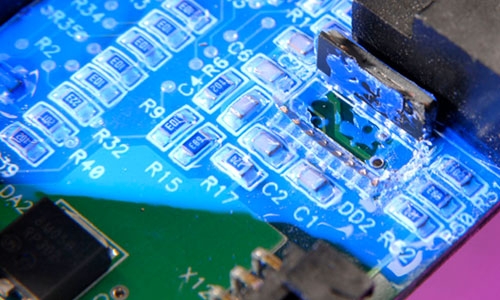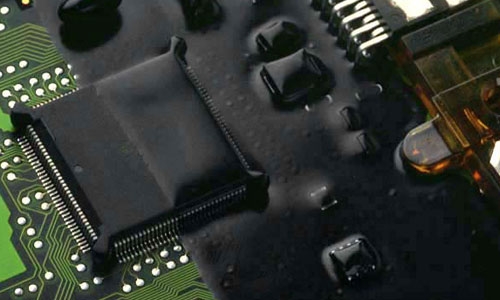Light-Cure Conformal Coatings that Solve Specific PCB Issues
Shielding printed circuit boards from environmental damage is the primary purpose for using light-cure conformal coatings. But what happens when the PCB has areas that cannot be fully cured after conformal coating application or a situation where identification on the board must be concealed? There are technologies available to overcome these obstacles.
CURING IN SHADOW AREAS
Shadowed or hard-to-reach areas beneath high-profile PCB components or high-density boards where a conformal coating may flow, and relative to light curing, may not be exposed to the curing light from above. If this is the case, it is important to have a secondary cure mechanism such as thermal (heat) or moisture.
Multi-Cure: Combines the high-speed cure of UV/Visible light with secondary cure mechanisms that enhance polymerization. This curing method is useful when light can only reach a portion of the bond line, or for tacking a part prior to thermal cure to allow easier handling and transport during the manufacturing process. Light-curing must be done prior to heat curing. Heat cure times will vary due to part configuration, volume of coating applied, and oven efficiency. There are a number of conformal coatings available with Multi-Cure technology.
Dual-Cure: Light/moisture-cure conformal coatings are formulated to cure upon exposure to light first and then with secondary ambient moisture over time. This secondary curing method ensures the material is fully cured, eliminates the need for a second process step, and removes concerns of component life degradation due to temperature exposure if using heat cure. Cure time depends on humidity level, amount of coating in shadowed areas, and proximity of shadowed coating to humidity. Coating entrapped under large components may have a prolonged cure time. Read more about dual-cure coatings.
CONCEALING COMPONENTS & CONFIRMING COATING PLACEMENT
Black Conformal Coatings: Protecting proprietary or sensitive information on PCBs can be especially important. Black conformal coatings improve circuit reliability in harsh conditions, but thanks to a matte black color, they have the added benefit of being able to conceal markings, labels, sensitive information, and other critical identification on circuit boards.
Colored Conformal Coatings: Some conformal coatings feature a bright color, like red, before cure to aid in easy visual confirmation of material placement and automated quality inspection. The red color is ideal to indicate how much coating has been applied onto the PCB and for high-volume applications where manual inspection is not utilized.
Read this blog post about the advantages of using conformal coatings to protect the electronics on your printed circuit boards and some of the applications where they are used.
_________________________________________________________
Enjoying This Content? Let’s Stay Connected.
If you’re finding value in our insights, why not get more of it—delivered right to your inbox? Subscribe to receive the latest technical articles, white papers, product news, and expert tips.


